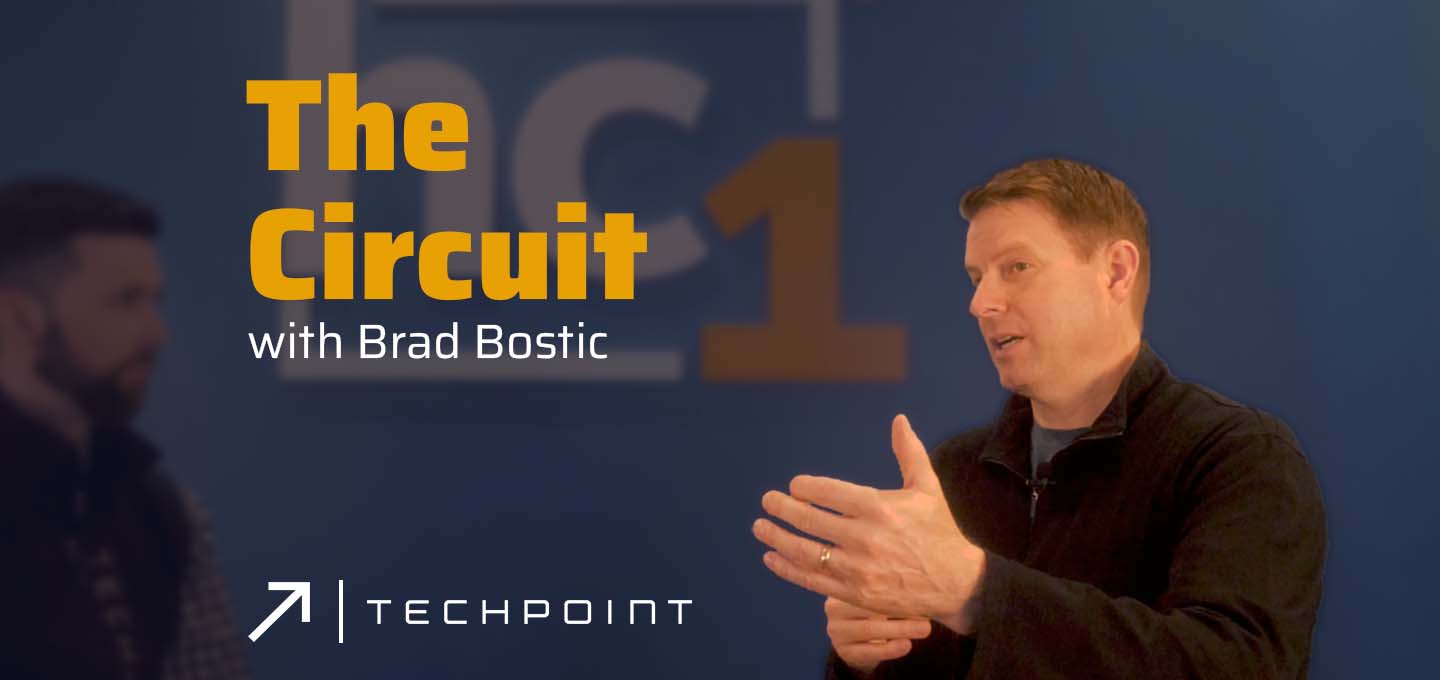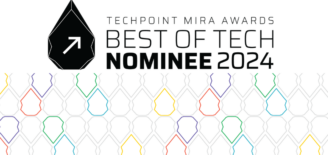Brad Bostic | hc1: The Rise (and Future) of Health-Tech
We talk to Brad Bostic, founder and CEO of hc1. Founded in 2011, hc1 is a cloud-based software company transforming lab data into personalized healthcare insights. Brad has ventures ranging from multiple health-tech companies to a VC firm, and even a health-tech SPAC. A career entrepreneur, Brad shares his story and his motivation for focusing on the healthcare industry. He reflects on how health-tech has evolved in the decade since hc1 was founded, and where the industry is headed.
Mike Langellier
Brad, welcome to The Circuit.
Brad Bostic
Thanks so much, Mike.
Mike Langellier
We’ve known each other for a long time. And yours is a story that I think has many different dimensions. I’m glad that we’ll be able to shed some more light on here today.
South Dakota to Indiana: An Entrepreneurial Journey.
Mike Langellier
We’ll get to hc1 and your professional pursuits here in just a second, but let’s start on the personal side you grew up in South Dakota, is that right?
Brad Bostic
Yes
Mike Langellier
And actually your journey to Indiana had nothing to do with business, that actually had to do with football, right?
Brad Bostic
Yeah, yeah. That, that was part of it. So yeah, I grew up in a small town called Brooking, South Dakota. Which, it’s the home of the South Dakota State Jackrabbits, who just made the tournament.
Mike Langellier
Nice.
Brad Bostic
March madness to be taken by storm by the Rabbits. And, then with my dad’s career, we moved to Sioux Falls, South Dakota. Okay. You know…
Mike Langellier
The big city.
Brad Bostic
Yeah. And just kind of grew up there until, heading into high school age. We moved then to Omaha, Nebraska. So, lived all over the, I don’t know what they call it over here, the Great Plains or whatever. I always thought it was the Midwest, but then, you know, ended up west, what we called the Midwest…
Mike Langellier
…you met the real Midwest.
Brad Bostic
Right.
Mike Langellier
Exactly. So you, but then you stayed in Indiana for college.
Brad Bostic
And so, parents… my parents actually, we had moved to Fort Wayne with my dad’s job. And, I was a senior in high school. They didn’t wanna make me move. So I stayed in Omaha for that. And then, ended up having an opportunity to come out to Indiana University and did play football at IU as well. And loved the business school that, that they had at IU. So that was kind of a big part of the decision as well.
Mike Langellier
So then after school you went into business but management consulting. So it didn’t start initially with entrepreneurship, but that was… what was the transition?
Brad Bostic
Well actually, the detail behind all of that is I remember going back to school, I’d always been kind of a self-taught coder. And I went back to school, after my sophomore year. And all of a sudden all the computer labs had, computers with Netscape. The first browser that got popular. And that made me realize like, wow, this is a, this changes everything. Now anyone can access the power of the internet. And so I actually wrote a business plan for a college textbook company on the web and started up a business while I was in college. While
Mike Langellier
You were at what? Senior year?
Brad Bostic
It was IU. It was, my, I guess that would’ve been my junior year. And then, you know, I made the irresponsible decision of deciding that running a business and going to school at the same time something had to give, so I made the irresponsible decision of deciding to graduate from college instead of just doing my business. And, but it was a profitable venture that, the business plan was where you could put in your class schedule and then we would just deliver all of your books based on what classes…
Mike Langellier
It’s a little bit of an e-commerce twist.
Brad Bostic
It was an e-commerce. Yeah. It was an e-commerce business. And, and so that was really what lit the fuse for me. And then my dad encouraged me to get a real job. Because he had had a great career in a big bank. And so that’s what led me to accept a position with Ernst and Young, doing management consulting and their, information systems, advisory and assurance division. I think it was called at the time. And, so went through some great training. There met a lot of great people who I still stay in touch with, all these years later. But after about, oh…
Mike Langellier
It wasn’t a long time. Right?
Brad Bostic
Yeah. It was sort of like maybe the human gestation period. I got, I got through, you know, maybe about nine months and realized, you know…
Mike Langellier
You got through training and…
Brad Bostic
Yeah. Working at a place with 60,000 people, was good for a lot of people, but it wasn’t really for me. And, so in a very amicable way, decided to transition out and start my own to do what consultancy, you know, cause I saw, hey, I can, I have these skills. And so I can just do these things, as an independent consultant.
Mike Langellier
Okay. So that was your first, well I guess second venture kind of.
Brad Bostic
Yeah, it was, yeah, it was my second. So it was really in college where I just, well, you know, and even rewinding from there, I remember growing up having a lot of friends, whose parents were entrepreneurs and my dad was a banker would give loans to entrepreneurs and talk to me about the businesses. And so I was always just attracted to that idea of being able to build something. And, and ended up, continuing with that theme. And yeah, here I am.
Mike Langellier
So what was that post-grad entrepreneurship journey like? How did you start off, put out your own shingle and get started?
Brad Bostic
It was the dumbest thing in the world. I literally had no idea really where I was gonna get a dime. I mean, but necessity’s the mother of invention. So back then we still used fax machines and you know, email was still a relatively novel thing. I mean, I’m old, this was like ’97, right? ’98.
Mike Langellier
But .com was really heating up at the time?
Brad Bostic
Oh yeah. Yeah. It was starting to, and, you know, I had been in the e-commerce book business and there was this other company I remember hearing about called Amazon, you know, it was in the book business and, so yeah, I just was really lucky to be at a time where there was all this excitement and all this opportunity. And, obviously it was a transformational moment in business. And so I just saw, hey, there’s so much that you can do. So I ended up, getting engaged interestingly with a wholesaler of office supplies, building e-commerce tools for them, for their customers to be able to order. And so I just kind of parlayed what I had learned, building my own business in college, into the sort of e-commerce trend and doing consulting for that.
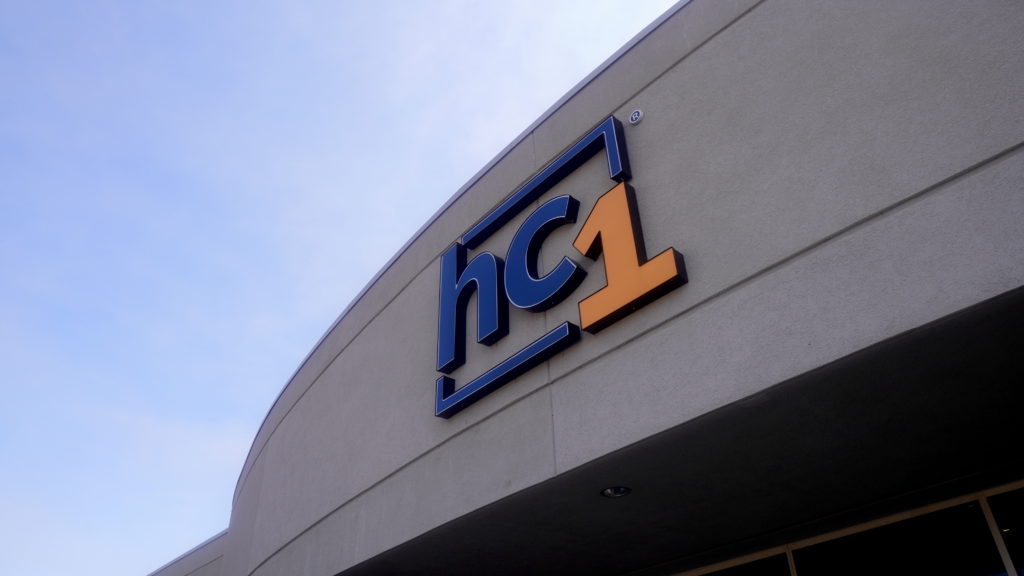
hc1 and The Path Into Healthcare.
Mike Langellier
Yeah. So then there were some, you know, kind of chapters in between, but if we fast forward, ultimately you got really compelled by healthcare as an industry. What was this? What was the story there?
Brad Bostic
Yes. Well, so first of all, my father-in-law, who’s a really entrepreneurial surgeon, had of a lot of influence on me when I was in those formative years. He was always explaining to me how the incentives worked in healthcare and he put together a big physician’s group at one point. Built a surgery center, did a lot of real estate work and then would, would really kind of bring me along and explain why these things were, how they were and would always point out that there’s just like an unlimited need in healthcare to make it better and more personalized. And then somewhere in there, in 1999, my mom actually was diagnosed with stage-4 colon cancer. Which is a, you know, completely preventable, really, almost completely preventable cancer. But you know, low and behold, she hadn’t been engaged in the protocols that would’ve identified that early.
Brad Bostic
And so then I saw firsthand in early 2000, just how impersonal healthcare delivery was. You know, even when you were a patient who needed a lot of care in one of the top healthcare institutions. So I just thought, man, this just shouldn’t happen this way. You know, we should be more proactive and preventative. And then once somebody does have an illness, there should be a better way to make that more personalized. So I’d say really, for me, the seed was planted in 2000, through watching her, which ultimately she lost her battle with cancer. You know, thinking like, gosh, we could really help people avoid this type of outcome and ideally make it so that people can live a lot longer and a lot healthier through a more proactive approach. That’s more tailored, you know, to your individual needs.
Brad Bostic
And healthcare wasn’t really ready though for that in 2000. So I can recall having some conversations with some executives of major health systems and they would love the intellectual ideas that I would bring in terms of how you could make healthcare more personalized. But the practical reality was their incentive was just to do more procedures and get more money that way.
Mike Langellier
It’s the way that the business model…
Brad Bostic
Yeah, incentive drives behavior. And thankfully though, you fast forward to today and there’s a huge renaissance underway moving to more of a value-based care paradigm. And that’s really what I’m passionate about, but I’d say it all started with experiencing that firsthand with my own mom and thinking like, gosh, what a… what more important purpose is there than going out and transforming healthcare.
Mike Langellier
So hc1 was born kind of out of that kernel and, and ultimately came to be the company. For those that are just not familiar with the company, why don’t you just give the thumbnail on what it is.
Brad Bostic
And really, it was about 10 years after my mom passed away that we launched hc1. And I had a number of other businesses that I was involved with, that I started and tele-radiology was one, and interoperability software company exchanging data and healthcare. So I took a lot of steps down the path. Ultimately into 2011, saw that the train had left the station on this move to a value-based care model, which just means that health systems and clinicians would increasingly be rewarded for demonstrating that they could make patients healthier by using less services. You know, keep you out of the hospital. And you would make more money as a doctor.
Mike Langellier
Really antithetical to the old model though?
Brad Bostic
Completely opposite. Yeah. I mean, in the sixties when Medicare and Medicaid were established to provide this fee-for-service model, it was really more of a safety-net for people who were in the retirement-age or that were, you know, kind of underserved and it expanded over time to become the predominant way that healthcare got paid for by Medicare, Medicaid and commercial insurance. And ultimately that’s led to about 4 trillion a year of expense in the US.
Mike Langellier
Wow.
Brad Bostic
Largely due to the inefficiencies that are in that model. Which really wasn’t intentional, it’s just incentives made that happen. And so now what we’re seeing is the emergence of models, like Medicare Advantage, there’s a program called the ACO Reach program, which is all about actually helping primary care physicians earn even more money. But doing it by keeping their patients much healthier. So we saw this trend happening in 2011. And said, you know, now is the time to create the best company in the world for plugging into all of this data and zeroing in on the digital risk signals proactively to better guide care for patients before they end up getting sick.
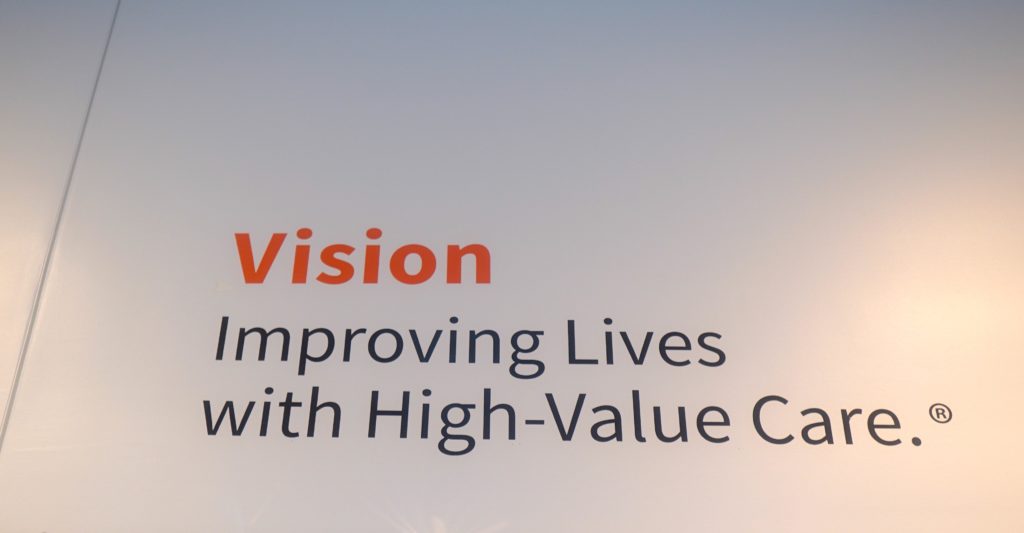
Lab Data, 80% of Your Health’s Story.
Mike Langellier
So healthcare’s a giant industry, lots of perspective, interventions, entrepreneurial interventions, so to speak, you picked one specifically around lab data and the workflow between healthcare systems and labs. Why go there? And what was the, what was the real intervention that you were trying to trying to initiate?
Brad Bostic
Well, I had learned through the school of hard knocks, you know, doing healthcare interoperability in a previous business that you can’t really go into a health system or a health plan or any part of the healthcare world and say, hey, I want all your data, you know, and then we’re gonna try to figure out later what we do with it. It’s just too hard, takes too long. It’s too confusing. But what I did pick up on was about 80% of the overall story of what’s going on with your health is told by your lab results. So if you think about every time you go to the doctor, there’s some kind of a blood draw and that generates data about you. And historically that data just gets stuck in a file, whether it’s physical or digital and not really utilized in an ongoing way to determine where you’re going with your health. But what we thought was, well, if we could plug into that 80% of the story through the lab data, we could have a beautiful bird’s eye view of the key risk signals that identify where you can intervene to make healthcare more personalized and more preventative, and ultimately diagnose people more effectively. And if you could diagnose them more effectively, they could get treated faster in more precise ways. So that was really where it all started it.
Mike Langellier
So for those that are not kind of intimately familiar with that process, how’s it typically work? So you go to the doctor, something you… it’s either, it’s either your typical routine checkup, or you’ve got an issue that you’re trying to get diagnosed, take a blood sample. That’s typically how, how it starts. And then they ship it to a lab, where?
Brad Bostic
A blood or a tissue sample. And there are labs that are independent in major labs. People have heard of folks like Quest Diagnostics, and others. And then there are hospital-owned labs. And so it’s really a mix. But regardless of where the test is being run, your specimen, your blood, or your tissue goes through a machine at my have in the case of pathology, an actual physician looking under a microscope and typing in notes, interpreting what’s going on. And then all of that data ultimately comes back to a clinician, whether that’s a nurse or your primary care doctor or specialist. And they look at it and say, okay, here’s what the interpretation is. You have certain numbers that are too high. You may be prediabetic or here’s a tissue read that says, Hey, you have some abnormal cells. We better do more testing.
Brad Bostic
So there’s all this data that gets generated. And if you think about that through the life cycle of, of anybody’s health, from when you’re born all the way through to when you die, there’s there’s story, that’s told about you based on all those lab results., like, there’s a point where we’re healthy, all the numbers are right. There are points where you get diagnosed with some kind of a condition, which almost always is informed by some level of lab diagnostic data. And so what we’ve been able to do is partner with the labs and with the health systems and with the health plans, and even with the medication, therapy companies to zero in on the best way to do testing, to get the most accurate diagnosis and to eliminate wasteful testing, and then also helping to connect those patients who have specific genetic traits that would make certain medications work better for them than others to get on those right medications. So, it’s really precision medicine. At scale, that all started with an idea that if we could just plug into and partner with these labs, we could generate so much more value from that data that otherwise was just getting squandered,
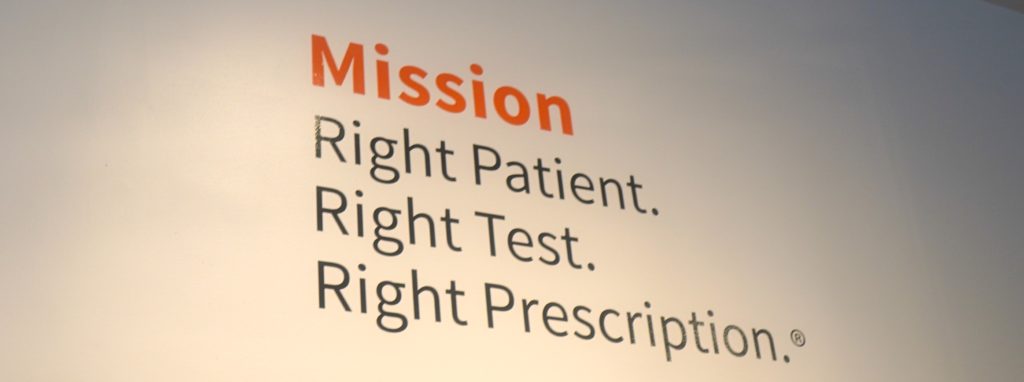
AWS + Machine Learning: Putting Lab Data to Work.
Mike Langellier
But that’s all predicated upon being able to get that data aggregated and be able to get it standardized in a way that then across millions and millions of patients, tens hundreds of millions of tests that then you’d be able to kind of reason over the top of it. I remember that, you were one of the early companies to kind of take this to the cloud. So to be able to realize that vision, but not easy at the time. Because, particularly when you’re talking about healthcare data at the time, that was, that was pretty early on.
Brad Bostic
Yeah, no doubt. In fact, I recall, just by chance, I had gotten introduced to this guy named Andy, who at the time was running Amazon Web Services, which was still kind of a new thing. And they were interested in having healthcare companies go to Amazon Web Services, but they didn’t have any concept of the information security agreement. There’s a thing called a BAA that you need to execute. That wasn’t even a thing that AWS did back then yet. And so thankfully they’ve been a great partner in advancing the ball and now they provide all those safeguards around the information that are specific to healthcare. And so ultimately we’ve been able to, start from day one in the cloud, which is unusual. Most companies that are doing these sorts of things are trying to do them have tried to take something that was already built and put it into a hosting model.
Brad Bostic
We’ve built everything natively in the cloud. And ultimately, we’ve been able to create machine learning models that have been trained now over more than 30 billion test results in the associated orders to be able to automate that, that organization of all the data. Which is a huge part of the challenge as you point out. You know, day one, it was a really daunting task. People would look at us and say, hey, why are you focused on the lab? You know, there’s like not a lot of margin there. It’s not a place for lot of people. It’s all in the basement. You know, it smells bad down there, you know? And I would explain, no, it’s, it’s the data, it’s the story, you know, it’s the information that advises you on what’s going on with the patients. And so now we have this really special, only of its kind ability to use machine learning and AI to not only organize the data, but also identify these risk signals where you’ve got over/underuse of testing and ultimately where you’ve got people who can benefit from advanced tests like genomics. And that’s something else that over the past 10 years think about how far genomics has come. So when we first started, we thought, hey, not only is that for…
Mike Langellier
Those that aren’t familiar genomics, give the…
Brad Bostic
Yeah. Genomics just means that you can run a test based on a tissue specimen that maps your specific genetic mutations, basically your… the fingerprint of how your body works. And that has implications around things like what are, certain, diseases that you could be predisposed or what kinds of medications can your body actually benefit from, or not literally, you have people taking medications today that all it’s doing is creating expensive urine because they literally cannot process it. They can’t process it. They can’t metabolize it. And in your genetic code, the instructions are there that say whether a medication will work for you or not.
Mike Langellier
It’s sometimes, it can actually be counterproductive or harmful.
Brad Bostic
Right. Absolutely. Especially when you have somebody who’s polypharmacy, meaning they’re on lots of meds, you know. And people who have cardiac conditions for example, are on average, I think on like nine different medications. And so you’ve got medications that can interact with each other and, and interact with your genetics and actually lead to really terrible, health outcomes, you know, including death. Medication issues are attributed to a lot of the deaths that happen unnecessarily in healthcare.

The Future of Health-Tech.
Mike Langellier
So, so paying it forward, what do you think the potential is now? Like you’ve seen multiple waves of this. One of them is just a model change from the kind of pay-per-service for more of a community health kind of model in healthcare, which is helping to enable some of this innovation you’ve seen and been on the front edge of the technological innovation, particularly around putting this compute power into the cloud and aggregating this data, standardizing it there. Now you look forward and all of these, the kind of machine learning AI technologies are getting better. You have these models running on top of the data to enable what, like how, when you think back to your mom’s situation, and how you wanted to then change healthcare for the better what potential do you have today and where do you see it going in the future?
Brad Bostic
Well see, you know, how you order a teddy bear and Amazon, and they treat it like it’s life or death, they delivered to you on time and they memorize exactly how that should all work.
Mike Langellier
I just got a notification. It wasn’t for a teddy bear, but exactly where it is and the schedule…
Brad Bostic
I know you’re stockpiling teddy bears, Mike. No, but in all seriousness, it’s that kind of experience in healthcare. Where you’re tailoring the way care is engaging. You proactively the way that you can get more information about what’s going on with your care. and ultimately for the point of becoming more preventative. So everybody who has any kind of a relative like I do that has had colon cancer and died from it. You know, we should get engaged earlier in preventative screening, like colonoscopies. And there are lots of different ways now to screen for this. And then people who actually do have some kind of a condition, a disease state, they can be diagnosed more effectively, sooner by having more tailored, dialed-in diagnostics, you know. Where it’s not just the panel of tests that give is given every single time and you can’t figure out what’s wrong or you don’t even identify that there’s an issue.
Brad Bostic
So I think that’s an opportunity. And then in doing all of that, you keep people well, which actually brings down the cost of healthcare. So we don’t bankrupt our economy with, you know, 20% of GDP already is getting consumed. Much of it unnecessarily. So the sky’s the limit. And I am more excited about the next 10 years of what hc1 is doing than what we’ve already done. And we’re really proud of what we’ve done. But we’ve actually now organized our enterprise to where we have a parent kind of platform business that allows us to participate in this integration and normalization and identification of risk signals across multiple different segments of healthcare. While each one of those can have leadership teams and their go-to-market, but it’s applying the same pattern that we’re incredibly good at to do even more in healthcare than what we could have ever done in more of a single threaded, model.
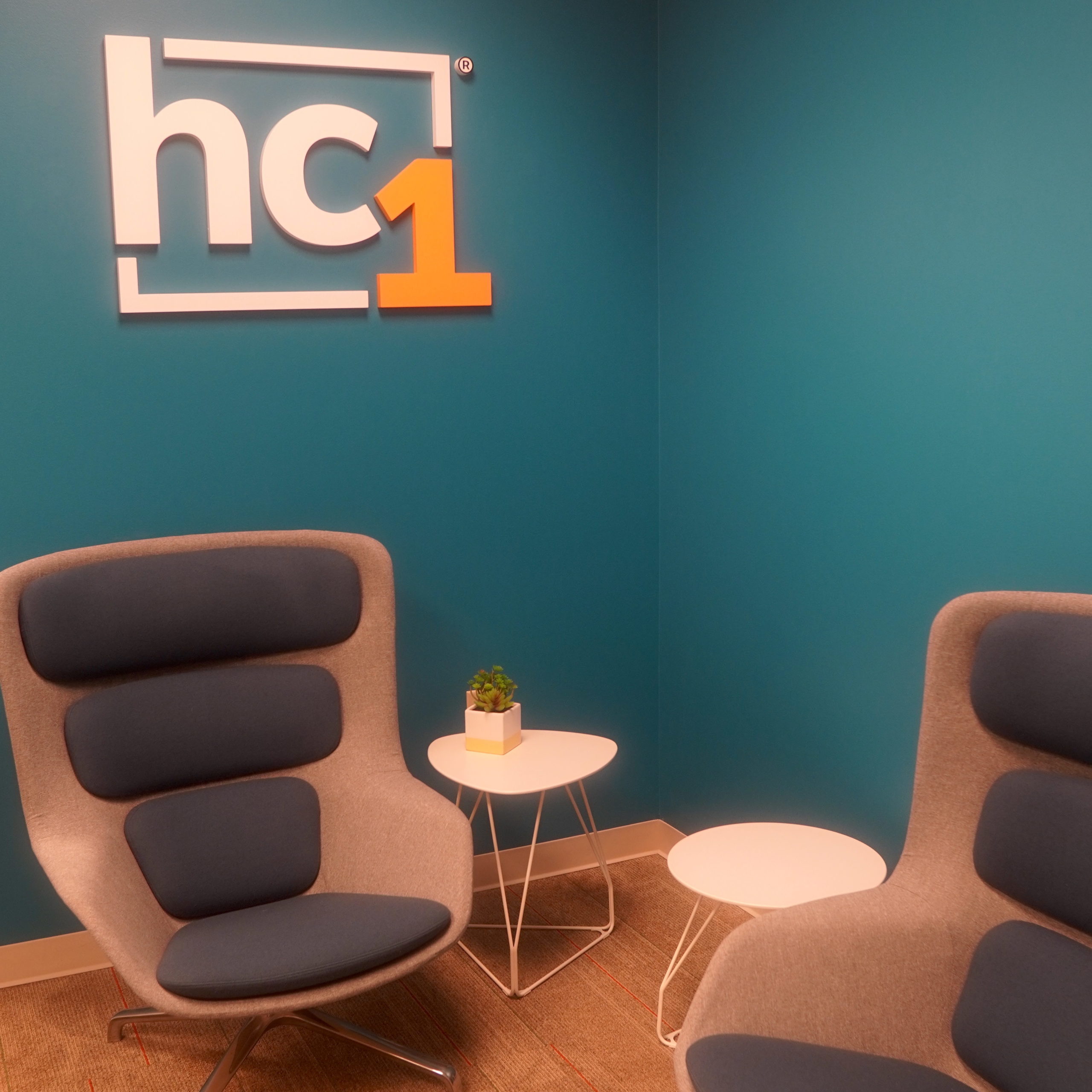
Future Health ESG: A $200 Million Health-Tech SPAC.
Mike Langellier
Yeah. Talk about that. You’ve done… I’ve just seen you go from hc1 specifically to kind of then a more… you’re in you’re spinning up multiple things, sort of a portfolio approach to healthcare innovation, including a SPAC. So you’ve, it’s sort of the innovation, not only around the technology and on the product side but even on the financial side and a venture capital fund as well to invest in companies. It seems you’ve got more of a macro, strategy for not just the specific use case of hc1, but ultimately how to kind of intervene in healthcare more broadly. What is that?
Brad Bostic
Yeah, certainly one of the parts of building something that makes an impact is having the expertise, but another big part of it is having the capital. And if you have the expertise that’s really unique, and you have the capital to be able to port the initiatives where you can bring value through your expertise as well, you can dramatically accelerate what you can bring to the world. And we’re completely dedicated to transforming healthcare in a positive way. And we don’t want that to be limited to only one particular area. And so yes, health cloud capital is a that I co-founded in 2017, focused on investing in these different businesses that we’re involved with that generally our businesses hc1 is able to power with our backend technology. So it’s a platform as a service kind of a model.
Brad Bostic
And then we also, sponsored, Future Health USG launched in September, which is a $200 million SPAC, as you pointed out. And what that allows us to do is help drive the larger scale businesses that need access to public capital, you know, hundreds of millions of dollars, but have a massive opportunity to make a meaningful impact on the way healthcare gets delivered. So we’re really looking to play bigger in this space. You know, we kind of built this foundation and understand this market. We think better than most and having the ability to bring the capital to bear that’s needed, you know, it’s a critical ingredient. Like you can build a rocket, but if you don’t have the fuel to get it to, you know, get out of the stratosphere. It doesn’t really matter.
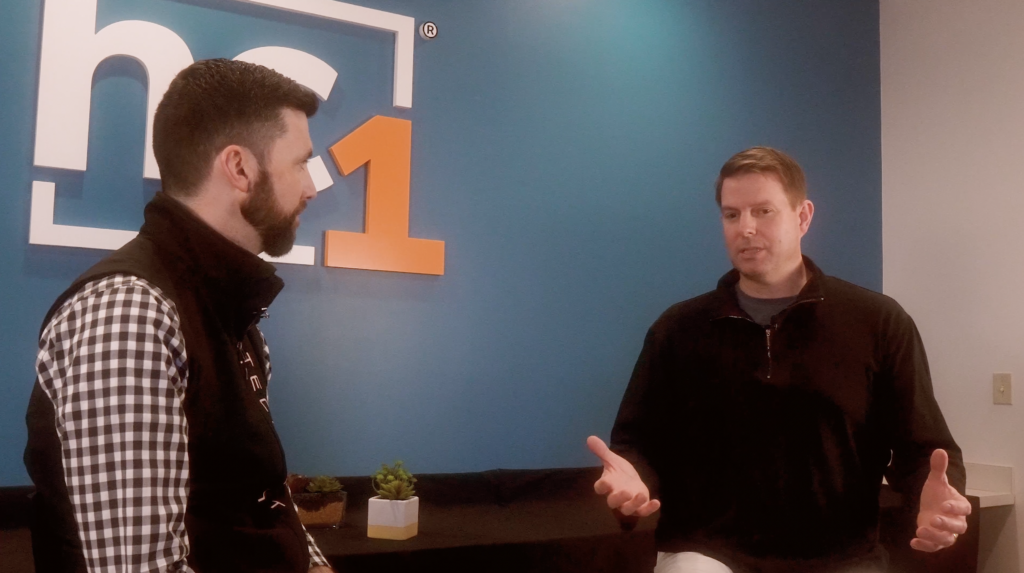
Indiana: The Epicenter of Healthcare Innovation.
Mike Langellier
We’re here on the Northwest side of Indianapolis where hc1 has been for a long time, but every day, hundreds of thousands of people are driving by without any idea that one of the leaders in the health-technology space is located right here. And all the things that you’re talking about are happening. Indianapolis is a place that’s known, not just for tech, but also, and for a long time, it’s been known for life sciences. Eli Lilly, one of the largest pharmaceutical companies is located here. Have large healthcare systems, have a lot of assets that are around healthcare, around life sciences. I think vision, not just of the healthcare market, like what you described, but of this place as a nucleus for health-tech innovation, what could it be? And, and what do you think are the key prescriptions or key ingredients that you would say need to be put in place in order to make it happen?
Brad Bostic
Well, I personally see Indiana as building toward this place where it is the epicenter of healthcare innovation. I believe we can do that. And I actually have seen firsthand that many of the traditional hotbeds for venture capital on the coast who are very good at software-as-a-service and, you know, modern consumer-oriented software kinds of models have struggled to meaningfully drive more of these B2B data-centric initiatives in the healthcare industry. And I think that’s for a multitude of reasons. But I think one of them is the actual expertise and the understanding of more of these deep, you know, backend data-oriented matters. It’s sort of the, you know, like getting into the engine versus just thinking about, you know, how can I design the next slick exterior of the vehicle. And if you look around the state, not only are we huge in, life sciences, like pharma, but we’re massive in medtech in this state.
Mike Langellier
That’s true.
Brad Bostic
Warsaw is untouched in terms of the headquarters, that are there for medtech, med device. And multiple kinds of devices, including orthopedic. We’ve got Cook Medical in our state, which is a real leader internationally. Still privately held, founded by Bill Cook in Bloomington, Indiana. And they’re an amazing multi-billion dollar medtech company. And then we have great health systems. We have great academic research centers. We’ve got folks like Regenstrief and Franciscan Health…
Mike Langellier
Largest med school in the country.
Brad Bostic
Yeah. Largest med school in the country with IU Health. And obviously, you know, IU Health just made a big commitment to additional dollars to the med school as well., recently. Obviously, you’ve got many, many large health systems, and then you also have this growing base of engineering talent that’s coming out of our universities in this state. Like, how could you ask for something more? And we have an incredibly progressive, business-oriented leadership, with Governor Holcomb and his team, we obviously have TechPoint and other initiatives that really are making an impact. I just see all this coming together as we can do something really big here, but I think incumbent upon all of us to do that is to think and play bigger. You know, we can’t always be the state where what we’re trying to do is just build something that’s a feature and then get acquired by somebody else, bigger that’s on the coast.
Brad Bostic
You know, it’s just factual. Like we have to find our way to have headquarters here to have those, you know, multi thousands of high paid jobs here. And what a better way to do it than in the most critical vertical industry. That’s still completely irrational, right? Like it is the only one that’s irrational still, and we’re gonna fix that. And I could imagine Indiana being home to headquarters for dozens or hundreds of different major companies, both public and private, and a big reason for us being in this back market is to look at different ways to, you know, bring public capital, bring deserving companies in. And considering in all cases, even though our universe of potential acquisitions, there is global, are there opportunities to bring great companies here to Indiana as well? So I think it could be really big.
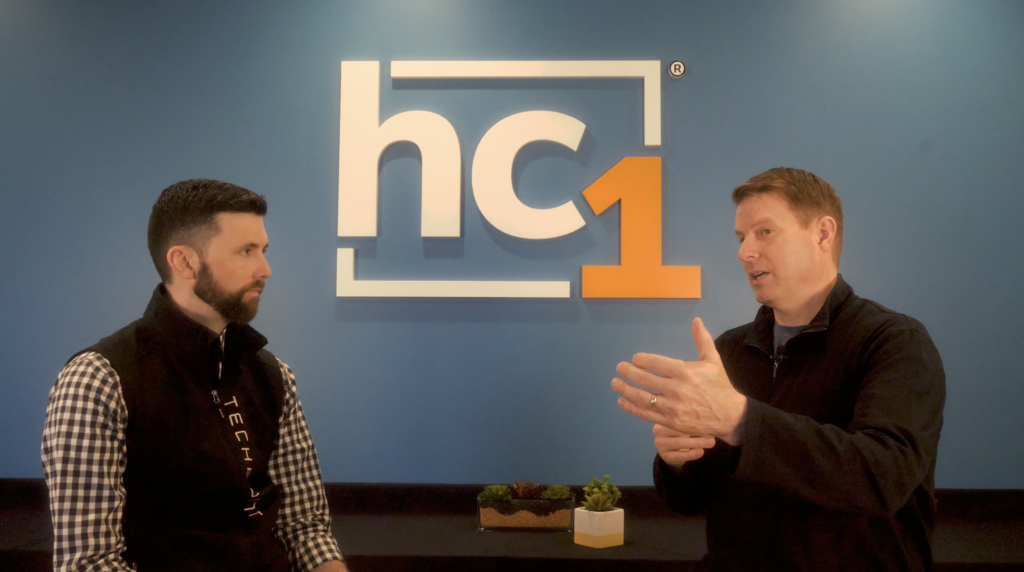
Advice For Future Health-Tech Founders.
Mike Langellier
Yeah, I love that. I love that. Are there particular areas where you that, where starting new companies, attracting companies investing capital in the healthcare marketplace, where are some of the next pressure points where you’re placing bets, maybe in companies you’re investing in, or companies that you’re starting, where do you think the big opportunities are?
Brad Bostic
Well, I think at a macro level, there’s such an abundance of information, but there’s a scarcity of time on the part of the actual people delivering care,
Mike Langellier
The doctors and nurses.
Brad Bostic
Yeah. They, I mean, think about even just in that example, I gave where there’s a genetic test that can inform what medications will work for you, but you need to know how to interpret that information in order to make that difference. And if I’m a doctor who has seven minutes to spend with my patient, I’m not gonna, I don’t want a 35 page report that I don’t understand. You know, so I think the, the ability to power up those clinicians with the right information on the highest risk cases where a difference can be made proactively, like those kinds of tools will completely transform healthcare. Like we will look by 10 and 20 years from now and be just blown away at how we were literally just operating with a blunt instrument as it relates to healthcare and realize that we can actually be laser focused, but it’s about interpreting the risk signals and then driving the actions that are needed to make that transformation.
Brad Bostic
And I think ultimately the consumer will continuously get more and more informed about what’s going on. You know, obviously we all have our biometrics and things that are becoming more commonplace. There’s just an unlimited ability to bring that proactive, preventative, and precise approach to care delivery where you don’t have to wonder, like, am I doing what I need to do? Now ultimately the individual has to take ownership for that as well. Like it’s, it’s not as though there’s some magic wand that we can wave and all of a sudden everybody’s perfectly healthy. But for those people who want to engage and they want to be informed, there should be a much more clear roadmap than there is right now. And I think that’s what will get realized through the collection of efforts of, you know, thousands of different businesses and hundreds of thousands of different entrepreneurs that have ideas that are, you know, trying things out.
Mike Langellier
Let’s end on the entrepreneurs. So when you talk to aspiring entrepreneurs, or maybe even people who are in the healthcare space, you want to jump over into starting a company in one of the areas that you described. What’s the advice you give them? What are some of the key tips that you give to those aspiring entrepreneurs that we would want to start things here?
Brad Bostic
Well if you’re thinking about an industry like healthcare, one of the big issues in healthcare is that it’s so dominated by, kind of the status quo, candidly, that you have to come up with ideas that are informed by expertise in the market, but don’t be burdened by how it’s always worked. And I, it sounds weird, but.
Mike Langellier
It’s hard balance.
Brad Bostic
It is.
Mike Langellier
Particularly in a regulated market.
Brad Bostic
Yeah. And so I’m not saying that as it, as it relates to information security or the regulatory side, it’s more just about the way that it could work versus the way it’s always worked from like a engagement perspective and an information management perspective. And I, the other thing I’d say is there has been such a massive investment now into all this it infrastructure with all these electronic health records that the government has helped to subsidize and to the tune of tens of billions of dollars. And the government has also in connection with that said you, electronic health record companies have got to provide access to the data in a secured way to enable other solutions and other value propositions, or your data blocking. And if you want to data block in order to try to wield a competitive advantage, that’s fine, but we want our money back.
Brad Bostic
You know, this is the government talking, right? And so there’s a major push to enable a more modern way to interact with all of this data that’s out there. And so I can’t even begin to convey all the ways that that creates value. But it’s what, when we first started, when I even first started on my journey, you know, 25 years ago, I was just always frustrated by the fact that there was this opaque kind of locked-up way data was managed. Even if you were the patient, like you couldn’t get insight into what was going on with your information., now that’s totally changing. So I think if you want to be a healthcare, health- tech entrepreneur, there’s a lot of value in coming at it in unique and creative ways. And looking at, okay, now that the data’s being liberated, how can I create solutions to help by disease state, by being preventative, by bringing better information to the clinical care delivery folks, the doctors, and their staff. I mean, the sky’s absolute limit. So I’d say if you have a great idea for healthcare and it can make it better, give it a try, you know, what are you gonna regret when you’re 80 and you’re looking back?
Mike Langellier
You know, it’s a good place to innovate. Alright, Brad. Well, thanks for sharing your story. This has been fascinating to hear more about, not only your background, but also more about what’s happening in the healthcare industry and best of luck to you.
Brad Bostic
Thanks so much, Mike. Appreciate it.
Want to stay up to date on when the next episode of The Circuit is released? Make sure to subscribe to TechPoint’s Index newsletter. You can also subscribe and download the audio version of The Circuit on Apple Podcasts, Spotify, Stitcher, or where ever you listen to podcasts.
ICYMI: Click here to check out Episode 3 of The Circuit, featuring Stephanie Cox, CEO of Lumavate.

